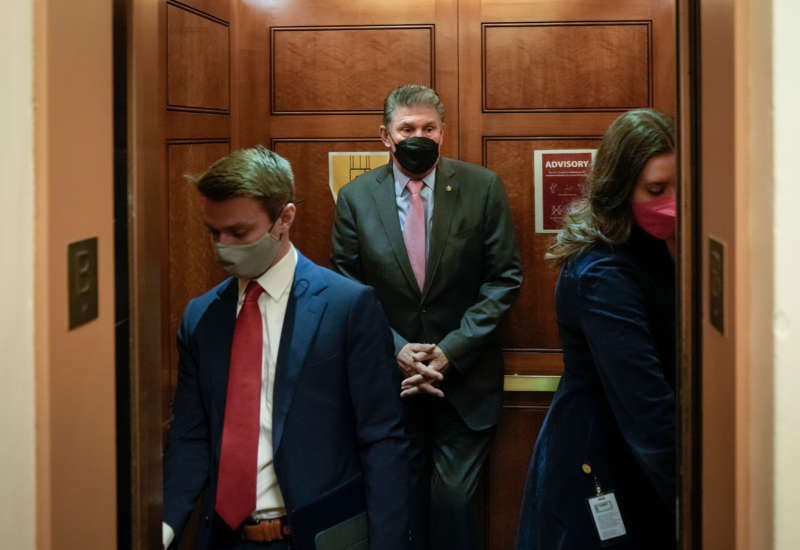As Democratic lawmakers rallied behind congressional staffers’ unionization effort on Tuesday, conservative Democrat Joe Manchin (West Virginia) expressed skepticism about the workers’ recently announced union drive.
Manchin claimed that he has “always been a big supporter of unions” — as many union-busting companies also claim – but added that congressional workers are paid by taxpayers. “When you’re working for tax dollars and you’re [at] will and pleasure, I’m here at the will and pleasure of the people. They have a chance to change and things of that sort, so we’ve got to make sure we’re doing it and doing it right,” he told Politico.
As reporters and pro-labor figures were quick to point out, there are already several congressional unions in place, as agencies like the Government Accountability Office, the Library of Congress and the Capitol Police have already unionized.
Manchin’s statement came after the Congressional Workers Union formally announced their union drive on Friday. Democratic staffers say they have been quietly organizing for over a year, and at least 78 members of Congress have publicly announced their support for the union effort, according to a count by Demand Progress.
Manchin’s argument that publicly-funded workers shouldn’t reap the benefits of unionization and collective bargaining is bizarre. In fact, according to the Bureau of Labor Statistics, public sector workers are consistently unionized at a higher rate than private sector workers; last year, about 39 percent of public sector workers were in a union, five times the unionization rate in the private sector.
If Manchin supposedly supports unions, but doesn’t support public sector unions because the workers are funded by the government, then it would appear – based on his own statements – that he doesn’t actually support a large swath of unions in the country.
Often, workers unionize not only to secure better wages and benefits, but also to combat poor working conditions. Indeed, many congressional staffers report not being paid sufficiently to live in Washington, D.C., which leads to high turnover rates. Further, staff are often viewed as dispensable, they have little say over their working conditions.
“There is a political culture that treats staff on Capitol Hill as being expendable,” Rep. Melanie Stansbury (D-New Mexico) told Bloomberg Law. “I certainly have heard senior staff and other congressional members in my time on the Hill allude to the fact that staff are a dime a dozen.”
For the past few months, an anonymous Instagram page called Dear White Staffers has been documenting abuses and microaggressions that staffers have experienced in the workplace, including having to run errands after hours or having things thrown at them by lawmakers.
“While not all offices and committees face the same working conditions, we strongly believe that to better serve our constituents will require meaningful changes to improve retention, equity, diversity, and inclusion on Capitol Hill,” the union said in a statement announcing their union drive.
Republicans in the Senate have already come out against the unionization efforts, and House Majority Leader Kevin McCarthy (R-California) announced his opposition to the drive on Tuesday. While Republican support for the effort won’t be necessary in the House, Republicans would likely need to be on board for a resolution giving staffers the green light to organize in the Senate.
House Democrats may soon have a chance to allow their staff to unionize, a process that would have to take place office-by-office, according to Insider. This week, Rep. Andy Levin (D-Michigan) is planning to introduce legislation that would allow staffers to unionize. Although it’s unclear if the legislation has the votes to pass, prominent Democrats like House Majority Leader Nancy Pelosi (D-California) have said that they will support the measure.


